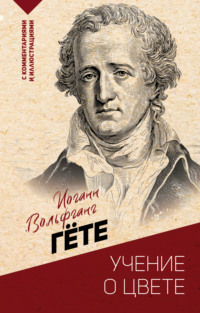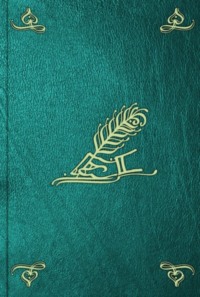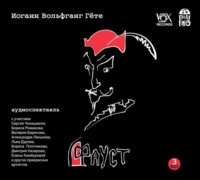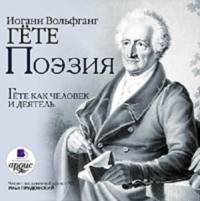 полная версия
полная версияThe Autobiography of Goethe
My chief curiosity now was to discover where the gate and bridge, for passing through the railing and over the canal, might be; since as yet I had not been able to find anything of the kind. I therefore watched the golden fence very narrowly as we hastened towards it. But in a moment my sight failed; lances, spears, halberds, and partisans, began unexpectedly to rattle and quiver, and this strange movement ended in all the points sinking towards each other, just as if two ancient hosts, armed with pikes, were about to charge. The confusion to the eyes, the clatter to the ears, was hardly to be borne; but infinitely surprising was the sight when falling perfectly level, they covered the circle of the canal, and formed the most glorious bridge that one can imagine. For now a most variegated garden parterre met my sight. It was laid out in curvilinear beds, which, looked at together, formed a labyrinth of ornaments; all with green borders of a low woolly plant, which I had never seen before; all with flowers, each division of different colours, which being likewise low and close to the ground, allowed the plan to be easily traced. This delicious sight, which I enjoyed in the full sunshine, quite rivetted my eyes. But I hardly knew where I was to set my foot; for the serpentine paths were most delicately laid with blue sand, which seemed to form upon the earth a darker sky, or a sky seen in the water: and so I walked for a while beside my conductor, with my eyes fixed upon the ground, until at last I perceived that, in the middle of this round of beds and flowers, there was a great circle of cypresses or poplar-like trees, through which one could not see, because the lowest branches seemed to spring out of the ground. My guide, without taking me directly the shortest way, led me nevertheless immediately towards that centre: and how was I astonished, when on entering the circle of high trees, I saw before me the peristyle of a magnificent garden-house, which seemed to have similar prospects and entrances on the other sides! The heavenly music which streamed from the building, transported me still more than this model of architecture. I fancied that I heard now a lute, now a harp, now a guitar, and now something tinkling, which did not belong to any of these instruments. The door which we approached opened soon after a light touch by the old man. But how was I amazed, when the porteress, who came out, perfectly resembled the delicate girl who had danced upon my fingers in the dream! She greeted me as if we were already acquainted, and invited me to walk in. The old man remained behind, and I went with her through a short passage, arched and finely ornamented, to the middle hall, the splendid dome-like ceiling of which attracted my gaze on my entrance, and filled me with astonishment. Yet my eye could not linger long on this, being allured down by a more charming spectacle. On a carpet, directly under the middle of the cupola, sat three women, in a triangle, clad in three different colours; one red, the other yellow, the third green. The seats were gilt, and the carpet was a perfect flower-bed. In their arras lay the three instruments which I had been able to distinguish from the outside; for being disturbed by my arrival, they had stopped their playing. "Welcome!" said the middle one, who sat with her face to the door, in a red dress, and with the harp. "Sit down by Alert, and listen, if you are a lover of music."
Now first I remarked that there was a rather long bench placed obliquely before them, on which lay a mandoline. The pretty girl took it up, sat down, and drew me to her side. Now also I looked at the second lady on my right. She wore the yellow dress, and had the guitar in her hand; and if the harp-player was dignified in form, grand in features, and majestic in her deportment, one might remark in the guitar-player an easy grace and cheerfulness. She was a slender blonde – while the other was adorned by dark brown hair. The variety and accordance of their music could not prevent me from remarking the third beauty, in the green dress, whose lute-playing was for me at once touching and striking. She was the one who seemed to notice me the most, and to direct her music to me; only I could not make up my mind about her; for she appeared to me now tender, now whimsical, now frank, now self-willed, according as she changed her mien and mode of playing. Sometimes she seemed to wish to move me, sometimes to teaze me; but do what she would, she got little out of me; for my little neighbour, by whom I sat elbow to elbow, had gained me entirely to herself; and while I clearly saw in those three ladies the Sylphides of my dream, and recognised the colours of the apples, I conceived that I had no cause to detain them. The pretty little maiden I would rather have captured, if I had not but too feelingly remembered the blow which she had given me in my dream. Hitherto she had remained quite quiet with her mandoline; but when her mistresses had ceased, they commanded her to perform some pleasant little piece. Scarcely had she jingled off some dancing tune, in a most exciting manner, than she sprang up; I did the same. She played and danced; I was hurried on to accompany her steps, and we executed a kind of little ballet, with which the ladies seemed satisfied; for as soon as we had done, they commanded the little girl to refresh me with something nice till supper should come in. I had indeed forgotten that there was anything in the world beyond this paradise. Alert led me back immediately into the passage by which I had entered. On one side of it she had two well-arranged rooms. In that in which she lived, she set before me oranges, figs, peaches, and grapes; and I enjoyed with great gusto both the fruits of foreign lands and those of our own not yet in season. Confectionary there was in profusion; she filled, too, a goblet of polished crystal with foaming wine; but I had no need to drink, as I had refreshed myself with the fruits. "Now we will play," said she, and led me into the other room. Here all looked like a Christmas fair; but such costly and exquisite things were never seen in a Christmas booth. There were all kinds of dolls, dolls' clothes, and dolls' furniture; kitchens, parlours, and shops, and single toys innumerable. She led me round to all the glass cases, in which these ingenious works were preserved. But she soon closed again the first cases, and said – "That is nothing for you, I know well enough. Here," she said, "we could find building materials, walls and towers, houses, palaces, churches, to put together a great city. But this does not entertain me. We will take something else, which will be pleasant alike to both of us." Then she brought out some boxes, in which I saw an army of little soldiers piled one upon the other, of which I must needs confess that I had never seen anything so beautiful. She did not leave me time to examine them closely in detail, but took one box under her arm, while I seized the other. – "We will go," she said, "upon the golden bridge. There one plays best with soldiers; the lances give at once the direction in which the armies are to be opposed to each other." We had now reached the golden trembling floor; and below me I could hear the waters gurgle, and the fishes splash, while I knelt down to range my columns. All, as I now saw, were cavalry. She boasted that she had the Queen of the Amazons as leader of her female host. I, on the contrary, found Achilles and a very stately Grecian cavalry. The armies stood facing each other, and nothing could have been seen more beautiful. They were not flat leaden horsemen like ours, but man and horse were round and solid, and most finely wrought; nor could one conceive how they kept their balance, for they stood of themselves, without a support for their feet.
Both of us had inspected our hosts with much self-complacency, when she announced the onset. We had found ordnance in our chests, viz., little boxes full of well-polished agate balls. With these we were to fight against each other from a certain distance, while, however, it was an express condition that we should not throw with more force than was necessary to upset the figures, as none of them were to be injured. Now the cannonade began on both sides, and at first it succeeded to the satisfaction of us both. But when my adversary observed that I aimed better than she, and might in the end win the victory, which depended on the majority of pieces remaining upright, she came nearer, and her girlish way of throwing had then the desired result. She prostrated a multitude of my best troops, and the more I protested the more eagerly did she throw. This at last vexed me, and I declared that I would do the same. In fact, I not only went nearer, but in my rage threw with much more violence, so that it was not long before a pair of her little centauresses flew in pieces. In her eagerness she did not instantly notice it, but I stood petrified when the broken figures joined together again of themselves; Amazon and horse became again one whole, and also perfectly close, set up a gallop from the golden bridge under the lime-trees, and running swiftly backwards and forwards, were lost in their career, I know not how, in the direction of the wall. My fair opponent had hardly perceived this, when she broke out into loud weeping and lamentation, and exclaimed that I had caused her an irreparable loss, which was far greater than could be expressed. But I, by this time provoked, was glad to annoy her, and blindly flung a couple of the remaining agate balls with force into the midst of her army. Unhappily I hit the queen, who had hitherto, during our regular game, been excepted. She flew in pieces, and her nearest officers were also shivered. But they swiftly set themselves up again, and started off like the others, galloping very merrily about under the lime-trees, and disappearing against the wall. My opponent scolded and abused me; but being now in full play, I stooped to pick up some agate balls which rolled about upon the golden lances. It was my fierce desire to destroy her whole army. She, on the other hand, not idle, sprang at me, and gave me a box on the ear which made my head ring again. Having always heard that a hearty kiss was the proper response to a girl's box of the ear, I took her by the ears, and kissed her repeatedly. But she gave such a piercing cry as frightened even me; I let her go, and it was fortunate that I did so; for in a moment I knew not what was happening to me. The ground beneath me began to quake and rattle; I soon remarked that the railings again set themselves in motion; but I had no time to consider, nor could I get a footing so as to fly. I feared every instant to be pierced, for the partisans and lances, which had lifted themselves up, were already slitting my clothes. It is sufficient to say that, I know not how it was, hearing and sight failed me, and I recovered from my swoon and terror at the foot of a lime-tree, against which the pikes in springing up had thrown me. As I awoke, my anger awakened also, and violently increased when I heard from the other side the gibes and laughter of my opponent, who had probably reached the earth somewhat more softly than I. Thereupon I sprang up, and as I saw the little host, with its leader Achilles, scattered around me, having been driven over with me by the rising of the rails, I seized the hero first and threw him against a tree. His resuscitation and flight now pleased me doubly, a malicious pleasure combining with the prettiest sight in the world; and I was on the point of sending all the other Greeks after him, when suddenly hissing waters spurted at me on all sides, from stones and walls, from ground and branches; and wherever I turned dashed against me crossways.
My light garment was in a short time wet through; it was already rent, and I did not hesitate to tear it entirely off my body. I cast away my slippers, and one covering after another. Nay, at last I found it very agreeable to let such a shower-bath play over me in the warm day. Now, being quite naked, I walked gravely along between these welcome waters, where I thought to enjoy myself for some time. My anger cooled, and I wished for nothing more than a reconciliation with my little adversary. But, in a twinkling the water stopped, and I stood drenched upon the saturated ground. The presence of the old man, who appeared before me unexpectedly, was by no means welcome; I could have wished, if not to hide, at least to clothe myself. The shame, the shivering, the effort to cover myself in some degree, made me cut a most piteous figure. The old man employed the moment in venting the severest reproaches against me. "What hinders me," he exclaimed, "from taking one of the green cords, and fitting it, if not to your neck, to your back?" This threat I took in very ill part. "Refrain," I cried, "from such words, even from such thoughts, for otherwise you and your mistresses will be lost." "Who then are you," he asked in defiance, "who dare speak thus?" "A favourite of the gods," I said, "on whom it depends whether those ladies shall find worthy husbands and pass a happy life, or be left to pine and wither in their magic cell." The old man stepped some paces back. "Who has revealed that to you?" he inquired, with astonishment and concern. "Three apples," I said – "three jewels." "And what reward do you require?" he exclaimed. "Before all things, the little creature," I replied, "who has brought me into this accursed state." The old man cast himself down before me, without shrinking from the wet and miry soil; then he arose without being wetted, took me kindly by the hand, led me into the hall, clad me again quickly, and I was soon once more decked out and frizzled in my Sunday fashion as before. The porter did not speak another word; but before he let me pass the entrance, he stopped me, and showed me some objects on the wall over the way, while, at the same time, he pointed backwards to the door. I understood him; he wished to imprint the objects on my mind, that I might the more certainly find the door, which had unexpectedly closed behind me. I now took good notice of what was opposite to me. Above a high wall rose the boughs of extremely old nut-trees, and partly covered the cornice at the top. The branches reached down to a stone tablet, the ornamented border of which I could perfectly recognise, though I could not read the inscription. It rested on the top-stone of a niche, in which a finely-wrought fountain poured water from cup to cup into a great basin, that formed, as it were, a little pond, and disappeared in the earth. Fountain, inscription, nut-trees, all stood directly one above another; I would paint it as I saw it.
Now, it may well be conceived how I passed this evening and many following days, and how often I repeated to myself this story, which even I could hardly believe. As soon as it was in any degree possible, I went again to the Bad Wall, at least to refresh my remembrance of these signs, and to look at the precious door. But, to my great amazement, I found ad changed. Nut-trees, indeed, overtopped the wall, but they did not stand immediately in contact. A tablet also was inserted in the wall, but far to the right of the trees, without ornament, and with a legible inscription. A niche with a fountain was found far to the left, but with no resemblance whatever to that which I had seen; so that I almost believed that the second adventure was, like the first, a dream; for of the door there is not the slightest trace. The only thing that consoles me is the observation, that these three objects seem always to change their places. For in repeated visits to the spot, I think I have noticed that the nut-trees have moved somewhat nearer together, and that the tablet and the fountain seem likewise to approach each other. Probably, when all is brought together again, the door, too, will once more be visible; and I will do my best to take up the thread of the adventure. Whether I shall be able to tell you what further happens, or whether it will be expressly forbidden me, I cannot say.
This tale, of the truth of which my playfellows vehemently strove to convince themselves, received great applause. Each of them visited alone the place described, without confiding it to me or the others, and discovered the nut-trees, the tablet, and the spring, though always at a distance from each other; as they at last confessed to me afterwards, because it is not easy to conceal a secret at that early age. But here the contest first arose. One asserted that the objects did not stir from the spot and always maintained the same distance: a second averred that they did move, and that too away from each other: a third agreed with the latter as to the first point of their moving, though it seemed to him that the nut-tree, tablet, and fountain rather drew near together: while a fourth had something still more wonderful to announce, which was, that the nut-trees were in the middle, but that the tablet and the fountain were on sides opposite to those which I had stated. With respect to the traces of the little door they also varied. And thus they furnished me an early instance of the contradictory news men can hold and maintain in regard to matters quite simple and easily cleared up. As I obstinately refused the continuation of my tale, a repetition of the first part was often desired. I was on my guard, however, not to change the circumstances much, and by the uniformity of the narrative I converted the fable into truth in the minds of my hearers.
Yet I was averse to falsehood and dissimulation, and altogether by no means frivolous. Rather, on the contrary, the inward earnestness with which I had early begun to consider myself and the world, was seen even in my exterior, and I was frequently called to account, often in a friendly way, and often in raillery, for a certain dignity which I had assumed. For, although good and chosen friends were certainly not wanting to me, we were always a minority against those who found pleasure in assailing us with wanton rudeness, and who indeed often awoke us in no gentle fashion from that legendary and self-complacent dreaming in which we – I by inventing, and my companions by sympathising – were too readily absorbed. Thus we learned once more, that instead of sinking into effeminacy and fantastic delights, there was reason rather for hardening ourselves, in order either to bear or to counteract inevitable evils.
Juvenile Stoicism.
Among the stoical exercises which I cultivated, as earnestly as it was possible for a lad, was even the endurance of bodily pain. Our teachers often treated us very unkindly and unskilfully, with blows and cuffs, against which we hardened ourselves all the more as obstinacy was forbidden under the severest penalties. A great many of the sports of youth, moreover, depend on a rivalry in such endurances; as, for instance, when they strike each other alternately, with two fingers or the whole fist, till the limbs are numbed, or when they bear the penalty of blows, incurred in certain games, with more or less firmness; when in wrestling or scuffling they do not let themselves be perplexed by the pinches of a half-conquered opponent; or finally, when they suppress the pain inflicted for the sake of teasing, and even treat with indifference the nips and ticklings with which young persons are so active towards each other. Thus we gain a great advantage, of which others cannot speedily deprive us.
But as I made a sort of boast of this impassiveness, the importunity of the others was increased; and, since rude barbarity, knows no limits, it managed to force me beyond my bounds. Let one case suffice for several. It happened once that the teacher did not come for the usual hour of instruction. As long as we children were all together, we entertained ourselves quite agreeably; but when my adherents, after waiting long enough, went away, and I remained alone with three of my enemies, these took it into their heads to torment me, to shame me, and to drive me away. Having left me an instant in the room, they came back with switches, which they had made by quickly cutting up a broom. I noted their design, and as I supposed the end of the hour near, I at once resolved not to resist them till the clock struck. They began, therefore, without remorse, to lash my legs and calves in the cruellest fashion. I did not stir, but soon felt that I had miscalculated, and that such pain greatly lengthened the minutes. My wrath grew with my endurance, and at the first stroke of the hour, I grasped the one who least expected it by the hair behind, hurled him to the earth in an instant, pressing my knee upon his back; the second, a younger and weaker ore, who attacked me from behind, I drew by the head under my arm, and almost throttled him with the pressure. The last, and not the weakest, still remained; and my left hand only was left for my defence. But I seized him by the clothes, and with a dexterous twist on my part, and an over precipitate one on his, I brought him down and struck his face on the ground. They were not wanting in bites, pinches, and kicks, but I had nothing but revenge in my limbs as well as in my heart. With the advantage which I had acquired, I repeatedly knocked their heads together. At last they raised a dreadful shout of murder, and were were soon surrounded by all the inmates of the house. The switches scattered around, and my legs, which I had bared of the stockings, soon bore witness for me. They put off the punishment, and let me leave the house; but I declared that in future, on the slightest offence, I would scratch out the eyes, tear off the ears, of any one of them, if not throttle him.
This event, though, as usually happens in childish affairs, it was soon forgotten, and even laughed over, was yet the cause that these instructions in common became fewer, and at last entirely ceased. I was thus again, as formerly, kept more at home, where I found my sister Cornelia, who was only one year younger than myself, a companion always growing more agreeable.
Still, I will not leave this topic without narrating some more stories of the many vexations caused me by my playfellows; for this is the instructive part of such moral communications, that a man may learn how it has gone with others, and what he also has to expect from life; and that whatever comes to pass, he may consider that it happens to him as a man, and not as one specially fortunate or unfortunate. If such knowledge is of little use for avoiding evils, it is very serviceable so far as it qualifies us to understand our condition, and bear or even to overcome it.
Another general remark will not be out of place here, which is, that as the children of the cultivated classes grow up, a great contradiction appears. I refer to the fact, that they are urged and trained, by parents and teachers, to deport themselves moderately, intelligently, and even wisely; to give pain to no one from petulance or arrogance, and to suppress all the evil impulses which may be developed in them; but yet, on the other hand, while the young creatures are engaged in this discipline, they have to suffer from others that which in them is reprimanded and punished. In this way, the poor things are brought into a sad strait between the natural and civilised states, and after restraining themselves for a while, break out according to their characters into cunning or violence.
Rudeness of Juvenile Companions.
Force is rather to be put down by force; but a well-disposed child, inclined to love and sympathy, has little to oppose to scorn and ill-will. Though I managed pretty well to keep off the active assaults of my companions, I was by no means equal to them in sarcasm and abuse; because he who merely defends himself in such cases, is always a loser. Attacks of this sort, consequently, when they went so far as to excite anger, were repelled with physical force, or at least excited strange reflections in me, which could not be without results. Among other advantages which my ill-wishers grudged me, was the pleasure I took in the relations that accrued to the family from my grandfather's position of Schultheiss, since, as he was the first of his class, this had no small effect on those belonging to him. Once, when after the holding of the Piper's-court, I appeared to pride myself on having seen my grandfather in the midst of the council, one step higher than the rest, enthroned, as it were, under the portrait of the Emperor, one of the boys said to me in derision, that like the peacock contemplating his feet, I should cast my eyes back to my paternal grandfather, who had been keeper of the Willow-inn, and would never have aspired to thrones and coronets. I replied that I was in no wise ashamed of that, as it was the glory and honour of our native city that all its citizens might consider each other equal, and every one derive profit and honour from his exertions in his own way. I was sorry only that the good man had been so long dead; for I had often yearned to know him in person, had many times gazed upon his likeness, nay, had visited his tomb, and had at least derived pleasure from the inscription on the simple monument of that past existence to which I was indebted for my own. Another ill-wisher, who was the most malicious of all, took the first aside, and whispered something in his ear, while they still looked at me scornfully. My gall already began to rise, and I challenged them to speak out. "What is more, then, if you will have it," continued the first, "this one thinks you might go looking about a long time before you could find your grandfather!" I now threatened them more vehemently if they did not more clearly explain themselves. Thereupon they brought forward an old story, which they pretended to have overheard from their parents, that my father was the son of some eminent man, while that good citizen had shown himself willing to take outwardly the paternal office. They had the impudence to produce all sorts of arguments; as, for example, that our property came exclusively from our grandmother, that the other collateral relations, who lived in Friedburg and other places, were all alike destitute of property, and other reasons of the sort, which could merely derive their weight from malice. I listened to them more composedly than they expected, for they stood ready to fly the very moment that I should make a gesture as if I would seize their hair. But I replied quite calmly, and in substance, "that even this was no great injury to me. Life was such a boon, that one might be quite indifferent as to whom one had to thank for it, since at least it must be derived from God, before whom we all were equals." As they could make nothing of it, they let the matter drop for this time; we went on playing together as before, which among children is an approved mode of reconciliation.









